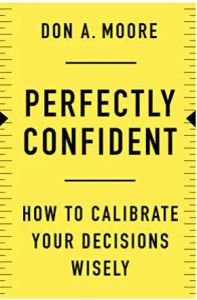Join getAbstract to access the summary!

Join getAbstract to access the summary!
Don A. Moore
Perfectly Confident
How to Calibrate Your Decisions Wisely
HarperBusiness, 2020
What's inside?
Overconfidence and underconfidence are destructive. Here’s why and how to find the sweet spot in between.
Recommendation
Confidence is a Goldilocks trait: The right amount serves you well; too little or too much can hurt you. UC Berkeley management professor Don A. Moore introduces three forms of confidence and provides examples that illustrate why well-calibrated confidence is desirable. He offers valuable advice on how to develop and project a healthy sense of confidence that will reap benefits in your personal and professional life.
Summary
About the Author
Don A. Moore, PhD, an expert on the psychology of decision making, is a professor of management at the University of California, Berkeley’s Haas School of Business and co-author of Judgment in Managerial Decision Making.


















Comment on this summary